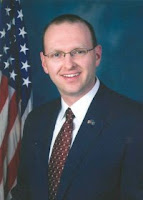Causer: Budget Needs Careful Study
 HARRISBURG – Gov. Tom Corbett unveiled his 2012-13 state budget proposal before a joint session of the General Assembly on Tuesday, said Rep. Martin Causer (R-Turtlepoint).
HARRISBURG – Gov. Tom Corbett unveiled his 2012-13 state budget proposal before a joint session of the General Assembly on Tuesday, said Rep. Martin Causer (R-Turtlepoint).The $27.1 billion plan includes no new or increased taxes and represents a 0.1 percent reduction in spending when compared to the current year’s budget. More than $1 billion in spending cuts were made to address an anticipated shortfall of $500 million by the end of the fiscal year, as well as at least $700 million in mandated cost increases in things like debt service, Medical Assistance and long-term care services.
“Controlled spending with no tax increases is a good starting point for budget negotiations, especially as the statewide economy still struggles to recover,” said Causer, a member of the House Appropriations Committee. “Like families across the state, we have to live within our means and prioritize our spending to focus on core government services. The governor has laid out his priorities, and it is now up to the Legislature to study his proposal in depth as we work toward adoption of a final plan by the end of the fiscal year in June.”
Causer said he also is pleased to see the administration is continuing its work to bring spending under control within the Department of Public Welfare and the Department of Corrections, two of the fastest-growing areas of the budget each year.
However, he expressed concern with some of the proposed cuts, especially the 30 percent cut in funding to state-related universities such as the University of Pittsburgh.
“One of the most important elements of an economic recovery is to bring more jobs to our communities, and a strong educational system is part of that,” Causer said. “I know many of my fellow legislators are also concerned about this, and we will be trying to find ways to better support our higher education institutions.”
Another concern for Causer is lack of funding for critical access hospitals, which is important to ensuring access to care in many areas of rural Pennsylvania.
As a member of the Appropriations Committee, Causer will take part in a series of budget hearings in late February and early March. Various department heads will appear before the committee to outline their funding needs and priorities. The hearings begin Tuesday, Feb. 21.
For more information about the budget, visit www.RepCauser.com.


.jpg)

Comments